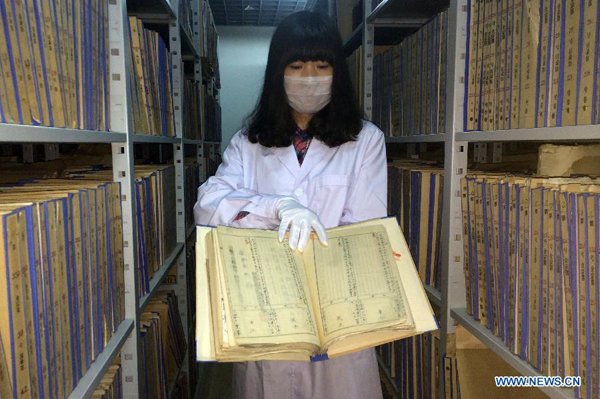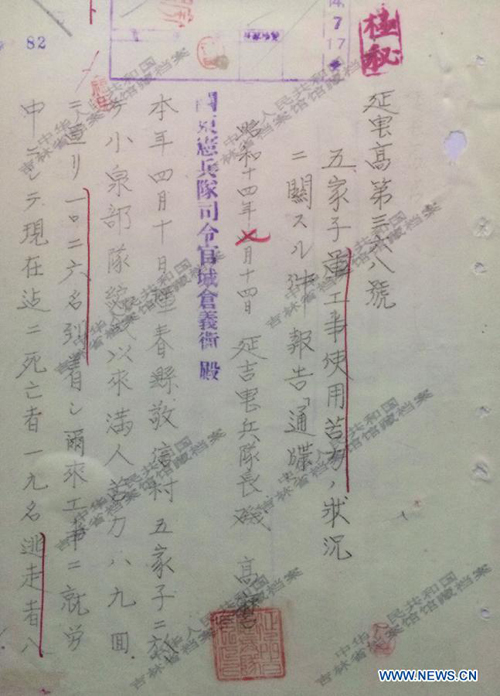Japanese occupation documents released to public

 0 Comment(s)
0 Comment(s) Print
Print E-mail CNTV, April 28, 2014
E-mail CNTV, April 28, 2014
The provincial archives in Northeast China's Jilin Province has made public 89 documents that were written by Japanese officers and reveal crimes committed by the Japanese army during its invasion of China. Discovered underground in 1953, the files include details of the Nanjing Massacre, sex slaves of the Japanese military, and activities of Japanese Army Unit 731. The files provide details of people sent to this unit who were never heard from again.
|
|
|
The provincial archives in Northeast China’s Jilin Province has made public 89 documents that were written by Japanese officers and reveal crimes committed by the Japanese army during its invasion of China. [Xinhua]. |
Among the images in the files, this man, Li Jizhu, can be vaguely identified. What was his fate?
Archive Number 37: Order on Soviet strategy-maker Li Jizhu, 28 years old.
Ordered to be "Specially transferred for disposal" on September 4th, and transferred to Japanese military police in Harbin on September 10th.
"Tokui Atsukai" -- the term frequently seen in relation to the handling of Soviet Union spies. It is translated into Chinese as "specially transferred for disposal". Where did these people end up? And what is it that made the transfer "special"?
The Jilin Archives files recorded 283 people who were "specially transferred" for being Soviet Union spies.
Sun Xiang is the man in this file. It says he was arrested in 1942, and in March 1944, the Kwantung military police ordered his "special transfer". The case he was involved in was labelled the Gang Xian Chun Soviet spy case. His records are relatively complete.
Sun Xiang was taken by the Japanese military police for questioning, along with a number of villagers. They were from SanMaJia Valley, in Heilongjiang Province's Luobei county.
The records say he had three sons -- Sun Derong, Sun Dehua and Sun Fugui. Are they still living in their hometown? Does the family know the fate of Sun Xiang?
Eventually, we were able to track down two grandchildren of Sun Xiang's -- Sun Hai and Sun Gang.
Records of Sun Xiang's life, and that of another man named Liu Desheng came to an end on February 9, 1944.
Archive Number 46: Order on the disposal of Soviet spies. In accordance with January 31st Jiaxian Battle Number 49, Soviet spies Liu Desheng and Sun Xiang are to be specially transferred.
|
|
|
A total of 89 wartime documents made public on Friday show details of atrocities Japanese troops committed in China during World War Two (WWII). The documents represent only a small portion of the nearly 100,000 wartime Japanese files retrieved underground during construction work in the early 1950s, said Yin Huai, president of the Jilin Provincial Archives in Changchun, capital of Jilin Province. Ninety percent of the files are in Japanese. [Xinhua]. |
Sun Hai and Sun Gang finally have an idea of the last known whereabouts of their grandfather. Sun Xiang disappeared 70 years ago, and these words are the sole remaining records of his life. His family has only an empty tomb to mourn him by.
The documents on Unit 731 are only a fragment of the 100, 000 volumes discovered in the headquarters of the Kwantung military police, which worked under the command of the Japanese Kwantung Army. These secret files are invaluable to unveiling details of the Japanese invasion and colonization of Northeast China.
Some of the files made publicly available by Jilin Archives Bureau provide evidence of the brutality of the Japanese Army. These are letters to home by Japanese soldiers in China, which were intercepted by the Army.
Archive Number 6:
"I killed one Chinese, I don't feel too good. Those scenes of killing would definitely frighten women back home. Stabbing people with a bayonet, it's like cutting a beancurd. My hands started to shake after one or two stabs."
Archive Number 31:
"We caught a man and a woman stealing coal. We stripped them naked, and inserted wooden sticks into their anuses. That was very fun."
There are over 200 books, and over 20, 000 pages of inspected mail in the Jilin Archives. Statistics from the Japanese military police itself say millions of mail could be checked in a month. Judging from the strict mail inspection, the Japanese army were committing crimes on the one hand, while hiding them on the other.








Go to Forum >>0 Comment(s)